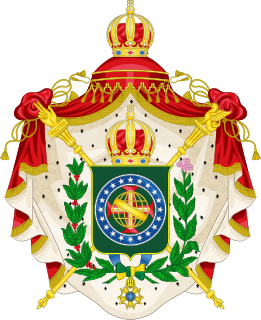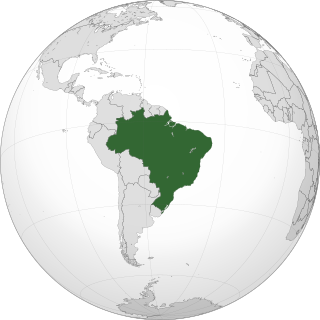 W
WThe history of Brazil begins with indigenous people in Brazil. Europeans arrived in Brazil at the ending of the 15th century. The first European to claim sovereignty over Indigenous lands part of what is now the territory of the Federative Republic of Brazil on the continent of South America was Pedro Álvares Cabral on 22 April 1500 under the sponsorship of the Kingdom of Portugal. From the 16th to the early 19th century, Brazil was a colony and a part of the Portuguese Empire. The country expanded south along the coast and west along the Amazon and other inland rivers from the original 15 donatary captaincy colonies established on the northeast Atlantic coast east of the Tordesillas Line of 1494 that divided the Portuguese domain to the east from the Spanish domain to the west, although Brazil was at one time a colony of Spain. The country's borders were only finalized in the early 20th century.
 W
WAjuricaba was a leader of the Manaos indigenous nation in the early 18th century. He rebelled against the colonizers, refusing to serve as a slave where he became a symbol of resistance and freedom. Born in Amazonian lands, spent many years away from the tribe, but was forced to return to the conviviality of the others after the murder of his father by the hands of the invaders. The native vowed revenge and sought out the Dutch — who were also enemies of Portugal — to put his plan into practice. The Manaos had allied themselves with the Dutch in Guyana. Ajuricaba, in an act considered an ostensible challenge to Portuguese sovereignty in the region, even carried a Dutch flag in his canoe. The Portuguese in the Amazon feared that other indigenous peoples as well as black slaves in the region would follow the example of the Manaos, thus paving the way for a Dutch invasion of the Amazon River valley, or opening a riot for a possible general revolt against the Lusitanian crown, forcing them into a direct conflict, a war they called of "guerra justa".
 W
WThe Black Guard of the Redemptress was a paramilitary secret society in Rio de Janeiro composed of Brazilian former slaves freed on May 13, 1888, by the signature of the Golden Law by Isabel, Princess Imperial of Brazil. The group was led by José do Patrocínio, a former Republican, and its ostensible purpose was to protect the well-being of the Brazilian Imperial Family and to ensure the Princess Imperial's accession to the throne, in opposition to the rising threat of a Republican coup. The group began its activities soon after the abolition of slavery and lasted until shortly around the Proclamation of the Republic in Brazil on November 15, 1889.
 W
WBraSCII is an encoded repertoire of characters that was used in Brazil. It was used in the 1980s on several printers, in applications like Carta Certa, in video boards and it was the standard character set in the Brazilian line of MSX computers. This code page is known by Star printers as Code page 3847.
 W
WBelow is a list of heads of state of Brazil.
 W
WThe Brazilian Anti-Corruption Act officially "Law No. 12,846" and commonly known as the Clean Company Act is a Brazilian law enacted in 2014 targeting corrupt practices among business entities doing business in Brazil. It defines civil and administrative penalties, as well as the possibility of reductions in penalties for cooperation with law enforcement under a written leniency agreement signed and agreed to between the business and the government.
 W
WFrancisco Xavier de Mendonça Furtado (1701–1769) served in Portugal's armed services rising in rank from soldier to sea-captain, then became a colonial governor in Brazil and finally a secretary of state in the Portuguese government. His major achievements included the extension of Portugal's colonial settlement in South America westward along the Amazon basin and the carrying out of economic and social reforms according to policies established in Lisbon.
 W
WThe German Amazon-Jary-Expedition (1935-1937) was a Nazi era scientific expedition in northéastern Brazil. The discovery of a huge cross emblazoned with swastika at the grave site of one of the expedition members in the local jungle has brought the event to renewed international attention during the second decade of the 21st century. Unlike numerous successful and reputable field trips all over Brazil by German research teams from various academic backgrounds during the 1930s, the Amazon-Jary-Expedition has been criticized for its political command, lack of academic necessities and infatuation with the commercial multi-media chronicle, which lead to suspicions about its true purpose. This impression was further reinforced during the following years as other controversial Nazi Germany missions took place, criticized for pseudo-scientific methods and unacceptable ethic standards and affiliated with dubious Nazi party agencies, that sought support for the crude ideas on their political agendas. The mission's leader had conceived plans for a military takeover of French Guiana, which, upon his return, he presented to Heinrich Himmler. There exists, however, no evidence for any official involvement in or adoption of these plans.
 W
WThe Grão Pará and Maranhão Company was a Portuguese chartered company founded in 1755 by the Marquis of Pombal to develop and oversee commercial activity in the state of Grão-Pará and Maranhão, an administrative division of the colony of Brazil. Employees of the company were officially considered to be in the service of the Portuguese Crown and were responsible directly to Lisbon. The company greatly increased the volume of trade in Grão-Pará and Maranhão, though after the Marquis of Pombal fell from power Queen Maria I ordered it to be shut down in 1778.
 W
WBrazil was discovered by Portuguese navigators on April 22, 1500 and becomes a colony of Portugal.
 W
WThe Magellan expedition, also known as the Magellan-Elcano expedition, resulted in the first recorded circumnavigation of the Earth in 1522. It is considered by many as one of the most important events in history for its scientific, socio-economic, political, philosophic and theological consequences.
 W
WManuscript 512 is a ten-page manuscript of dubious veracity and unknown authorship that relates the discovery of a "lost city" in the Brazilian province of Bahia by a group of bandeirantes in 1753. Originally found in 1839 at the National Library of Brazil, where it is kept to this day, the document describes curious sights, monuments, and artifacts of Graeco-Roman appearance found by the group in the abandoned settlement.
 W
WMoidores or moydores were historically gold coins of Portuguese origin. They usually featured a face value of "4000 réis", the Portuguese coat of arms on the obverse, and the Order of Christ Cross on the reverse, and were minted from 1677 to as late as 1910, mainly in Portugal and in Portuguese colonies like Brazil and Mozambique. Gold coins were also issued in fractions or multiples of moidores, ranging from one-tenth of a moidore to five moidores.
 W
WThe Odebrecht–Car Wash leniency agreement, also known in Brazil as the "end of the world plea deal", was the leniency agreement signed between Odebrecht S.A. and the Public Prosecutor's Office (PGR) in December 2016, as part of Operation Car Wash. The agreement provided for the deposition of 78 of the contractor's executives, including the former president Marcelo Odebrecht, and his father, Emílio Odebrecht, which generated 83 investigations at the Supreme Federal Court (STF).
 W
WThe Republic of Independent Guiana commonly referred to by the name of the capital Counani, was a short-lived independent state in South America.
 W
WSquatting in Brazil is the occupation of unused or derelict buildings or land without the permission of the owner. After attempting to eradicate slums in the 1960s and 1970s, local governments transitioned to a policy of toleration. Cities such as Recife, Rio de Janeiro and São Paulo have large informal settlements known as favelas. A more recent phenomenon is the occupation of buildings in city centres by organised groups. In rural areas across the country, the Landless Workers' Movement (MST) arranges large land occupations.